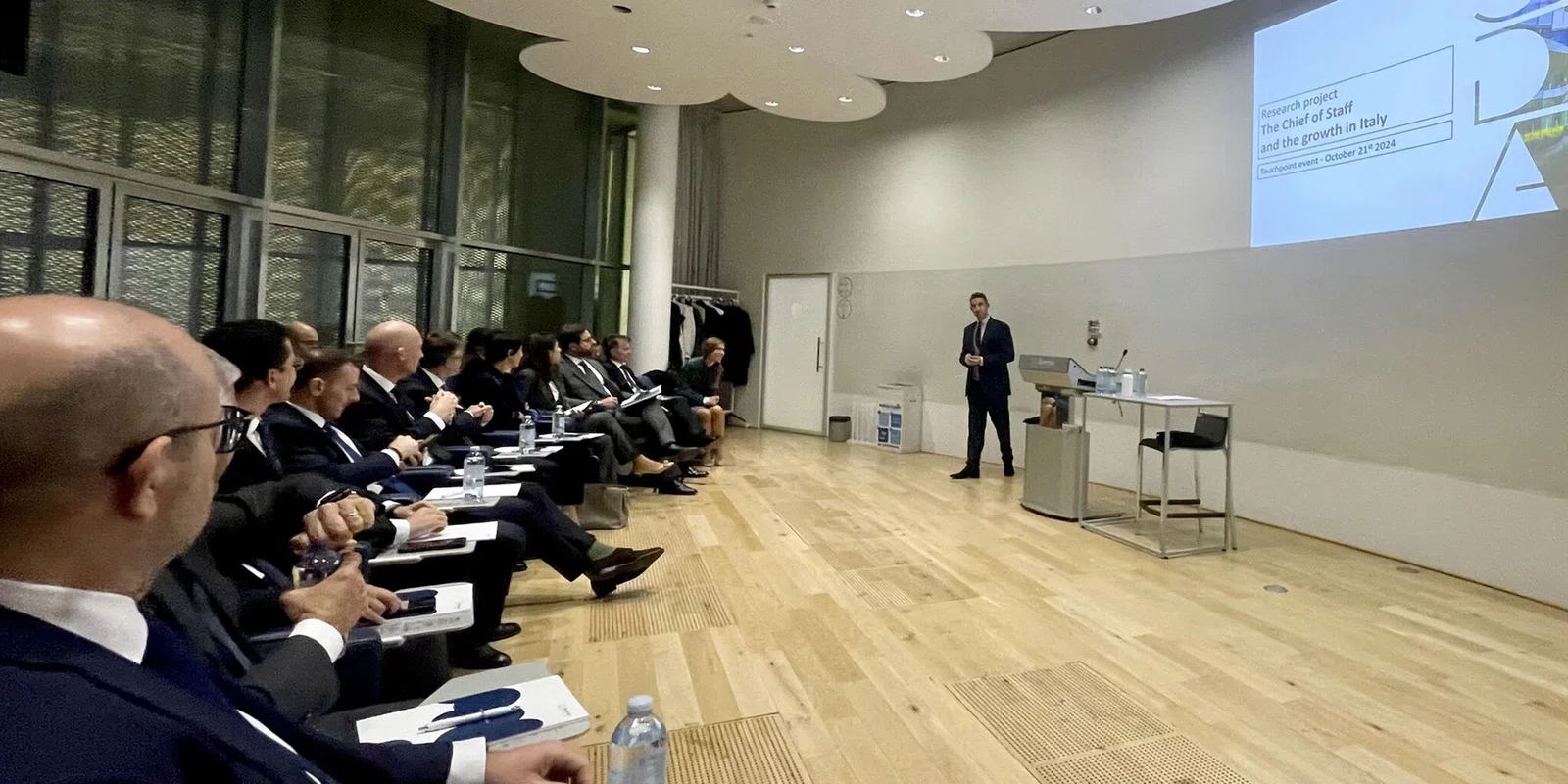



Close
result
VIEWPOINT
The chief of staff: a multifaceted role designed for strategic impact
The chief of staff: a multifaceted role designed for strategic impact
Stefania Pizzuto
5 min read

Stefania Pizzuto highlights the chief of staff’s vital role in driving workflow efficiency and leadership success – and the need for role clarity and recognition.
Talk to anyone about the role of chief of staff, and one word that inevitably arises is ‘versatility’.
Despite its growing adoption – initially in the USA but increasingly throughout the world – the role remains shrouded in mystery for many, especially in the European region. For this reason, Deloitte is currently undertaking two research projects aimed at shedding light on the strategic importance of the position.
A first research project conducted by ICE - SDA Bocconi School of Management (Milan), of which Deloitte is partner, has resulted in a report that clarifies what a chief of staff does within a company, how their role optimises the principal’s time and energy, and how they influence corporate efficiency. This research report has a focus on the Italian Chief of Staff landscape and will be published in February 2025.
A second research project that Deloitte is working on with the Chief of Staff Association offers a more international perspective, and it is focused on understanding the symbiotic relationship between a chief of staff and their CEO, and the key factors that contribute to building this unique relationship with a deep dive into the financial services sector. The findings of this research will be released in the first half of 2025.
For many chiefs of staff, versatility is part of the role’s allure. The lack of a rigidly defined position allows them to move seamlessly across different levels of the organisation, communicate informally, identify weak signals, and influence decisions discreetly.
But in the large, complex organisations with which I work I’d argue that role clarity and seniority are essential to achieving the fundamental purpose of the role, which is to facilitate leadership effectiveness within the C-suite.
As a Human Capital Partner at Deloitte, I am deeply invested in defining and elevating the chief of staff role internationally. Drawing on my own experience as a former chief of staff, I lead an international initiative at Deloitte (Chief of Staff Advisory) to help clients, especially those who don’t have a chief of staff, to establish this function effectively within their companies. One Deloitte asset we leverage to support our clients in the chief of staff enablement journey is our Business Chemistry tool. Based on years of research and thorough analysis of human behaviour within business, Business Chemistry provides immediate insights into individual and team behaviour in a corporate context. It consists of an online self-assessment with 68 questions and an interactive workshop to explore the tool, profiles, team composition, and dynamics. We believe this tool can effectively support leaders in optimising matchmaking with the right chief of staff. When there is a strong chemistry match between the chief of staff and a CEO/CxO , there is a higher probability that together they can exploit the full potential of the role and that the chief of staff can act as a leader effectiveness accelerator. Business chemistry principles also could support each chief of staff in navigating complex stakeholder environments by offering practical solutions to creating effective and maximised working relationships.
At Deloitte, we believe the chief of staff role requires very specific skills and should operate at C-level or at least at Senior Vice President level (C-1). Anything below this diminishes the potential impact of the role. The chief of staff is more than an executive assistant with expanded responsibilities; they are a strategic operator, a project manager with a nuanced understanding of people, processes and organisational dynamics. Success in this role requires a blend of strong soft skills such as negotiation and deep listening – qualities that are hard to pick up without substantial professional experience.
More importantly, a chief of staff is tasked with managing the complexity that a CEO or leader has to deal with every day. And they do that with a high level of autonomy, with the authority to set priorities, manage the flow of information, and tackle strategic challenges head-on. This autonomy, paired with clear seniority, is what makes the role truly effective.
A common misconception is that an Executive Assistant (EA) can effortlessly transition into the role of chief of staff. Leaders sometimes believe that a trusted EA with deep organisational knowledge can simply step into the CoS role, but they soon realise that success as a CoS requires a broader skill set and a different relationship with the principal. They often find they need someone with more experience, like a senior manager or director, and a way of resetting the relationship. Many skilled EAs could become excellent chiefs of staff, but I would recommend that they should first move into project management or operations to gain necessary skills and break the existing principal/EA dynamic. The CoS role demands a different kind of relationship where the principal and CoS collaborate more equally.
Autonomy and the ability to challenge are crucial to being an effective chief of staff, but so too is the status to command the respect of other leaders beside the principal. The latter is something that individuals can develop through their own social and political skills – but it is a good deal easier with a job title and a role that are well understood.
This is one of the reasons I believe that we should be bold and firm in how we define and position the chief of staff role. If we do not, then the whole concept can get muddled, which undermines the credibility and importance of the position.
At Deloitte, we are committed to advancing the understanding and adoption of the chief of staff role across organisations of all sizes. Together with the Chief of Staff Association, we are working to establish best practices and promote recognition of this critical position.
By championing the importance of the role and clarifying its purpose, we can help organisations fully leverage the potential of the Chief of Staff – transforming ambiguity into opportunity and impact.

Author Bio
Stefania Pizzuto
Partner, Deloitte
16 years of experience in managing business transformation, generating stakeholder engagement and creating a real impact on people and organizations have taught Stefania how to become a dynamic people leader, an effective strategic planner and executor as well as a force multiplier for the leaders she has served over the years.
During her extensive international experience in London, Madrid and New York, Stefania has built a proven record of successes leading and delivering complex and strategic transformational programmes for high profile stakeholders and business leaders. Most of all, she has learned how to build leaders’ trust, delivering excellence, working effectively in complex situation and environments, thanks to attention to details, strong communication skills and sensitivity.
Stefania has an extensive experience serving as Chief of Staff/Business partner in prominent international FSI institutions and within DELOITTE EMEA/Global. She has designed and launched the Chief of Staff Centre of Excellence with the goal to professionalize the role of the Chief of Staff and support clients in the Chief of Staff enablement journey. Stefania is Head of Impact for the Deloitte DCM Consulting Business and a member of the People & Purpose Leadership Team.





